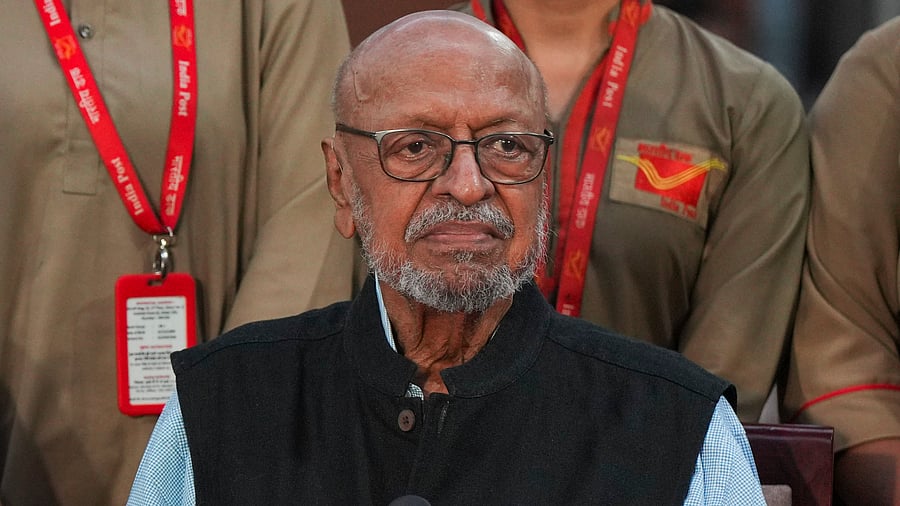
Deceased filmmaker Shyam Benegal.
Credit: PTI Photo
With Shyam Benegal's death on Monday, India has lost one of the pioneers of the parallel cinema movement.
A little boy flings a stone at the zamindar’s house towards the end of Benegal's first feature film 'Ankur' (1974). One of the most talked about scenes in Indian cinema, it speaks eloquently about how an oppressor is eventually challenged. 'Ankur' (The Seedling) casts a keen, critical eye on social inequalities.
All of Benegal's films discuss social causes. He takes up the subject of women's exploitation in 'Nishant' (1975). Shabana Azmi's character, the wife of a school teacher, is continuously raped by the landlord's brother until the entire village revolts against them.
When the restored version of 'Manthan' (1976) was screened at Cannes Film Festival last year, it received a five-minute-long standing ovation. It was India's first crowd-funded film, with five lakh farmers donating Rs 2 each. 'Manthan' is inspired by the milk cooperative movement pioneered by Verghese Kurian.
In 'Manthan', Benegal juxtaposes the 'Churning of the Ocean' from Hindu mythology with present-day social realities. Even the rakshasas helped the gods find nectar. The question of who will help society now find its nectar forms the crux of 'Manthan' (The Churning).
Benegal's first three films reveal his sympathies for the marginalised, and set a socio-political perspective for his subsequent works. They are timeless and remain relevant to this day.
His last film 'Mujib: The Making of a Nation' was a biographical film on Sheikh Mujibur Rahman, known as the founding father of Bangladesh.
Benegal was born in a Konkani-speaking Chitrapur Saraswat Brahmin family on December 14, 1934, in Hyderabad. He received the Dadasaheb Phalke Award for lifetime achievement in 2005. Apart from 'Ankur', 'Nishant' and 'Manthan', 'Bhumika' (1977) and 'Kondura' (1978) are his other critically acclaimed films.
'The Making of the Mahatma' (1996), based on the book 'The Apprenticeship of a Mahatma' by Fatima Meer, showed the early life of Gandhi.
His most popular TV series Bharath Ek Khoj was based on Jawaharlal Nehru's 'Discovery of India'.
His 2005 film 'Netaji Subhas Chandra Bose: The Forgotten Hero' showcases the events that led Subhash Chandra Bose to the formation of the Azad Hind Fauj.
His other prominent films are 'Susman', 'Mammo', 'Sardari Begum', 'Zubeida', 'Well Done Abba' and 'Hari-Bhari'.
Benegal collaborated with young and emerging talents like Anant Nag, Shabana Azmi, Smitha Patil and Naseeruddin Shah. He preferred shooting on location and captured the essence of the real world.
Govind Nihalani, his longtime camera associate says in an interview, "Shyam's first film Ankur was also my first film as a cameraperson and it was one of the most satisfying projects because Shyam does not just want you to light up a shot and operate the camera for him. He involves you in the process of evolving the shot. So you are not just a camera person but you also become a part of the entire creative process. That has gone a long way in my evolution as a director."
Rooted and perceptive
"Benegal was able to influence more people because he made his films in Hindi. The films of Mrinal Sen and Satyajit Ray didn’t get all-India visibility right away because they were made in Bengali. Benegal’s films were rooted. They had a local flavour and espoused a political cause and ideology. As a filmmaker, he was very encouraging."
— Girish Kasaravalli